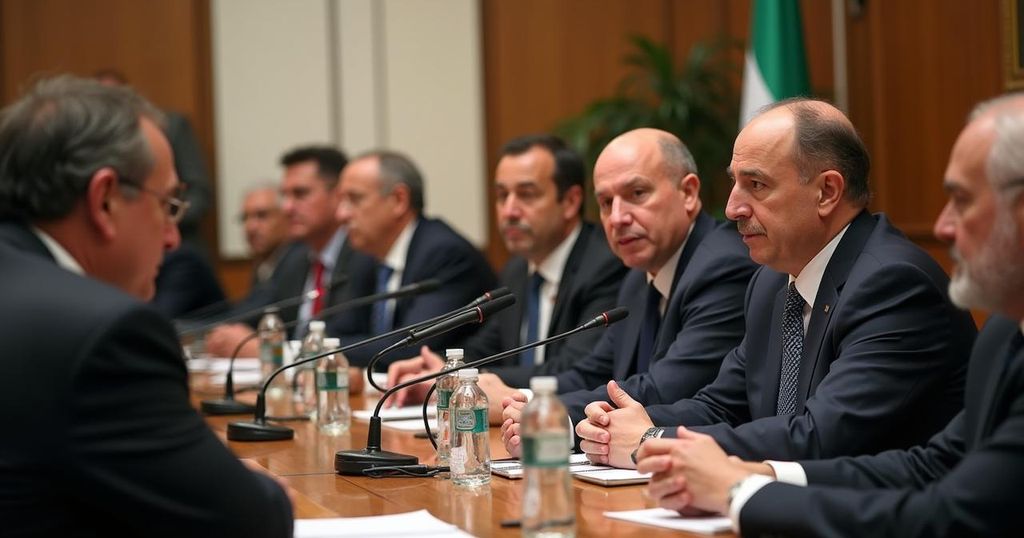Egypt and Qatar Coordinate on Gaza Ceasefire Efforts and Palestinian Reconciliation Talks
On October 12, 2024, Egyptian Minister Badr Abdelatty and Qatari Prime Minister Sheikh Mohammed bin Abdulrahman Al Thani engaged in discussions focused on achieving a ceasefire in Gaza, facilitating humanitarian aid, and promoting Palestinian reconciliation. The talks also addressed the critical situation in Lebanon amid Israeli aggression, emphasizing the need for coordinated efforts in humanitarian support.
On October 12, 2024, a crucial diplomatic dialogue took place between Egyptian Minister of Foreign Affairs and Immigration Badr Abdelatty and Sheikh Mohammed bin Abdulrahman Al Thani, the Prime Minister and Minister of Foreign Affairs of Qatar. The discussions were framed within the context of ongoing cooperation between the two nations, addressing vital developments occurring in the Gaza Strip and Lebanon. The primary focus of their conversation was on collaborative efforts to secure a ceasefire in Gaza, facilitate the release of hostages, and guarantee unhindered humanitarian access to affected populations. Furthermore, they reviewed Egypt’s initiatives aimed at Palestinian reconciliation, which include the recent invitation extended to delegations from both Fatah and Hamas in Cairo. This initiative seeks to bolster Palestinian national interests at this critical juncture for the Palestinian cause. In addition, the ministers spoke about the dire circumstances in Lebanon exacerbated by Israeli military actions and accentuated the necessity for a ceasefire while supporting all Lebanese state institutions, particularly the Lebanese army. They underscored the importance of implementing UN Resolution 1701, which is essential for the deployment of the Lebanese army in southern Lebanon, and highlighted the urgent requirement of electing a consensus president to stabilize the country’s institutions. There was a shared recognition between Minister Abdelatty and his counterpart from Qatar of the imperative for synchronized regional and international efforts to provide urgent humanitarian, shelter, and medical assistance to the Lebanese populace. They noted the severe impact of Israeli aggression, which has displaced over 1.2 million people, and stressed the importance of maintaining Lebanon’s sovereignty and territorial integrity while advocating for the withdrawal of Israeli forces from Lebanese territory. The discussion also pointed to the necessity for the Israeli forces to ensure the safety of personnel from the United Nations Interim Force in Lebanon (UNIFIL). On October 9, 2024, subsequent to this dialogue, representatives from the Fatah movement led by President Mahmoud Abbas and the Islamic group Hamas convened in Cairo to further address the Israeli offensive in Gaza and explore avenues for national unity. A Hamas official expressed that these discussions were pivotal in formulating plans for collaboration in the aftermath of the recent Gaza conflict that commenced on October 7, 2023. These ongoing talks also aim to bridge the longstanding divide that has existed since Hamas took control of Gaza in 2007.
The recent discussions between Egypt and Qatar come amidst escalating tensions in the Gaza Strip and Lebanon, where military actions have had significant humanitarian impacts. The effort towards a ceasefire and humanitarian access is part of a broader concern for regional stability. Palestinian reconciliation efforts between Fatah and Hamas also play a critical role in establishing a unified Palestinian front which is essential in negotiations and governance. Additionally, the ongoing Israeli activities in Lebanon have raised alarms regarding the stability and sovereignty of Lebanese state institutions, necessitating international attention and intervention.
In conclusion, the dialogue between Egypt and Qatar highlights the urgent need for a coordinated response to alleviate the humanitarian crises resulting from the conflicts in Gaza and Lebanon. The discussions not only emphasize the importance of a ceasefire and humanitarian access but also reinforce the significance of Palestinian reconciliation efforts as a means to bolster the Palestinian cause. The focus on safeguarding Lebanon’s integrity amidst foreign aggression underscores the complexities inherent in regional politics, necessitating ongoing international support and collaboration.
Original Source: www.egypttoday.com




Post Comment